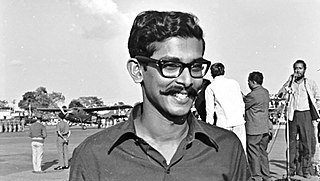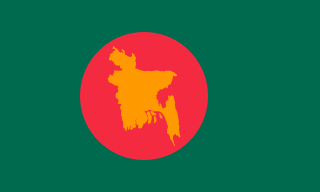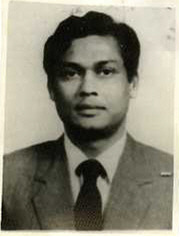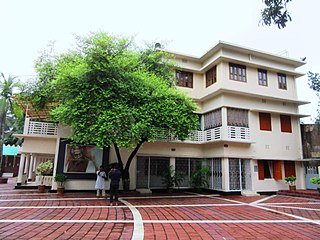Related Research Articles

Khondaker Mostaq Ahmad was a Bangladeshi politician. He was the Minister of Commerce in the third Mujib Rahman ministry under Sheikh Mujibur Rahman, and assumed the presidency of Bangladesh after the Assassination of Sheikh Mujibur Rahman on August 15, 1975. He praised the assassins as "sons of the sun" and put cabinet ministers loyal to Sheikh Mujibur Rahman in jail. He was himself deposed by another coup, less than three months later on November 3, 1975.
The Bangladesh Krishak Sramik Awami League was a political front comprising the Bangladesh Awami League, the Communist Party of Bangladesh, the National Awami Party (Muzaffar) and Bangladesh Jatiya League.

Sheikh Mujibur Rahman, the first president of Bangladesh, was assassinated along with most of his family members during the early hours of 15 August 1975 by a group of Bangladesh Army personnel who invaded his residence as part of a coup d'état. The Minister of Commerce, Khondaker Mostaq Ahmad, immediately took control and proclaimed himself head of an interim government from 15 August to 6 November 1975; he was in turn succeeded by Chief Justice Abu Sayem. The assassination marked the first direct military intervention in Bangladesh's civilian administration. Lawrence Lifschultz characterized this incident as an outcome of the Cold War between the United States-influenced Pakistan and the Soviet Union-influenced India. 15 August is annually observed as National Mourning Day, a commemorative day in Bangladesh.

Sheikh Kamal was the eldest son of Sheikh Mujibur Rahman, former President of Bangladesh and the younger brother of Sheikh Hasina, the former Prime Minister of Bangladesh.
Jail Killing Day is observed by the Awami League (AL) of Bangladesh and many other political organisations on 3 November every year. It commemorates the killing of four Awami League and national leaders: former vice-president Syed Nazrul Islam, former prime minister Tajuddin Ahmed and Captain (Rtd.) Mansur Ali, and former home minister A H M Quamruzzaman on this date in 1975.

Independence Day is celebrated on 26 March as a national holiday in Bangladesh. It commemorates the country's declaration of independence from Pakistan in the early hours of March 26, 1971.

The Bangladesh Freedom Party, also known as Freedom Party is a political party founded by Sayed Farooq Rahman, Khandakar Abdur Rashid and Bazlul Huda who were the chief organisers of the assassination of Sheikh Mujibur Rahman on 15 August 1975.

Shariful Haque Dalim (born 2 February 1946) is a former Bangladeshi army officer and ambassador of Bangladesh. He was also convicted for his part in the assassination of President Sheikh Mujibur Rahman in 1975.

Tungipara Sheikh family of Tungipara is one of the two most prominent Bangladeshi political families, other being the Zia family. The family primarily consists of Sheikh Mujibur Rahman, Sheikh Hasina, Sheikh Rehana and their relatives. Their political involvement has traditionally revolved around the Bangladesh Awami League.
Sultan Shahriar Rashid Khan was a Bangladeshi army officer who was convicted for the assassination of Sheikh Mujibur Rahman, the founding father and then President of Bangladesh. On 28 January 2010, Rahman was hanged along with Syed Faruque Rahman, A.K.M. Mohiuddin Ahmed, Mohiuddin Ahmed, and Mohammad Bazlul Huda in Old Dhaka Central Jail.
S.H.M.B Noor Chowdhury is a Bangladesh army officer who was convicted for the assassination of Sheikh Mujibur Rahman, president of Bangladesh, and for involvement in the murder of four national leaders in the Jail Killing. As of 2017, he was a fugitive, residing in Canada. The Canadian government has refused to extradite him, because he faces the death penalty in Bangladesh.
Mohammad Bazlul Huda was a Bangladeshi Army officer and freedom fighter who was convicted of the assassination of Sheikh Mujibur Rahman, founding president of Bangladesh. On 28 January 2010, Bazlul was executed along with Syed Faruque Rahman, Sultan Shahriar Rashid Khan, Mohiuddin Ahmed, and A.K.M. Mohiuddin Ahmed in Old Dhaka Central Jail.

The military coup in Bangladesh on August 15 of 1975 was launched by mid-ranking army officers in order to assassinate founding president Sheikh Mujibur Rahman, whose administration post-independence grew corrupt and reportedly authoritarian until he established a one-party state-based government led by the socialist party Bangladesh Krishak Sramik Awami League. Mujib, along with his resident family members, were killed during the coup but was survived by his two then-expat daughters, one of them being future prime minister Sheikh Hasina. The officers were led by Capt. Abdul Majed, Maj. Sayed Farooq Rahman, Maj. Khandaker Abdur Rashid and Maj. Shariful Haque Dalim.
The non-cooperation movement of 1971 was a historical movement in then East Pakistan by the Awami League and the general public against the military government of Pakistan in March of that year. After the announcement of the suspension of the session of the National Assembly of Pakistan on 1 March, the spontaneous movement of the people started, but officially on the call of Sheikh Mujibur Rahman, the non-cooperation movement started on 2 March and continued until 25 March. The movement lasted for a total of 25 days.
The 3 November coup d'état was a military coup in 1975 by Brig. Gen. Khaled Mosharraf against President Khondaker Mostaq Ahmad to remove the assassins of Sheikh Mujib from power and Mostaq from the Presidency. It was the result of a power struggle between the regime of Mostaq Ahmad and the mid-ranking officers backing him, Capt. Abdul Majed, Maj. Syed Faruque Rahman, Maj. Khandaker Abdur Rashid and Maj. Shariful Haque Dalim, and Mosharraf and the high-ranking officers supporting him, Col. Shafaat Jamil, Lt. Col. Abu Taher Mohammad Haider and Col. Khondkar Nazmul Huda. The high-ranking officers were worried about army discipline with "junior mutinous officers issuing orders from the presidential palace". With the coup, Mosharraf promoted himself to the rank of major general and the post of Chief of Army Staff after placing Maj. Gen. Ziaur Rahman under house arrest while the mid-ranking officers went on exile, as was agreed upon between the belligerents. The coup lasted 3 days, after which A. S. M. Sayem was installed as president while Mosharraf served as the Chief Martial Law Administrator.
2020 (MMXX) was a leap year starting on Wednesday of the Gregorian calendar, the 2020th year of the Common Era (CE) and Anno Domini (AD) designations, the 20th year of the 3rd millennium and the 21st century, and the 1st year of the 2020s decade.
Abdul Majed was a Bangladeshi military officer who was convicted for his role in the assassination of Sheikh Mujibur Rahman, the founding president of Bangladesh.

The premiership of Bangabandhu Sheikh Mujibur Rahman began on January 12 of 1972 when he was sworn in as the Prime minister after briefly serving as the President after returning from Pakistan's jail on January 10, 1972. He served as the Prime Minister of Bangladesh until January 25, 1975, for three years, and later led the parliament to adopt an amendment of the constitution that made him the President of Bangladesh, effectively for life.
The Jail Killing refers to the murder of four leaders of the Awami League political party in Bangladesh by army officers who carried out a coup d'état there on 15 August 1975. The four killed were former President Syed Nazrul Islam, former prime ministers Tajuddin Ahmad and Muhammad Mansur Ali, and President of Awami League A. H. M Qamaruzzaman.
The Sayem ministry led what eventually became the first interim government in independent Bangladesh and an unofficial model for future interim regimes. It was formed on 8 November 1975, following the assassination of Brig. Gen. Khaled Mosharraf on 7 November amid a nationwide soldier and public uprising against his 3 November coup d'état. After a three-day coup with support of some high-ranking officers and his Dhaka Brigade, Mosharraf had forced Khondaker Mostaq Ahmad, who, following the 15 August coup that assassinated the founding president Sheikh Mujibur Rahman, replaced him as President of Bangladesh with support of the mid-ranking assassin officers, to resign. Chief Justice Sayem, with the constitutional requirement for the direct election of the president and role of the vice-president as acting president suspended by Mostaq under a martial law proclamation, had been installed in his place. With Mosharraf's death the responsibility of CMLA fell on Sayem.
References
- ↑ Amnesty International Report. Amnesty International Publications. 1979. p. 184. ISBN 9780862100209 . Retrieved 10 October 2016.
- ↑ Kādira, Muhāmmada Nūrula (2004). Independence of Bangladesh in 266 days: history and documentary evidence. Mukto Publishers. p. 208. ISBN 9789843208583 . Retrieved 10 October 2016.
- ↑ Asian Survey. University of California Press. 1981. p. 196. Retrieved 10 October 2016.
- ↑ Awami League Rule: Glimpses From The International Press. Oasis Books. 1992.
- ↑ "Assassination of Sheikh Mujibur Rahman (1975) - Dalim incident proves a sore point for young army officers - History of Bangladesh". Londoni. Archived from the original on 26 September 2020. Retrieved 3 July 2020.
- 1 2 "Shahriar's confession". The Daily Star. 19 November 2009. Retrieved 10 October 2016.
- ↑ "Bangladesh, at Age 3, Is Still a Disaster Area". The New York Times. 13 December 1974. Retrieved 10 October 2016.
- ↑ Riaz, Ali (2005). Unfolding State: The Transformation of Bangladesh. de Sitter Publications. p. 239. ISBN 9781897160107 . Retrieved 10 October 2016.
- 1 2 "h4p16". www.majordalimbu.com. Archived from the original on 16 February 2020. Retrieved 3 July 2020.
- ↑ "Farooq's confession". The Daily Star. 19 November 2009. Retrieved 10 October 2016.
- ↑ News Review on South Asia and Indian Ocean. Institute for Defence Studies & Analyses. 1976. p. 240. Retrieved 10 October 2016.
- ↑ The Amnesty International Report. Amnesty International Publications. 1979. p. 184. ISBN 9783947492008 . Retrieved 10 October 2016.
- ↑ মেজর ডালিম ও তার স্ত্রীকে তুলে নিয়ে যাওয়া গাজী গোলাম মোস্তফার ভাগ্যে কী ঘটেছিলো ? Pinaki The Untold. Pinaki Bhattacharya (in Bengali). 20 December 2021. Retrieved 21 December 2021.
- ↑ "Samad Azad pays tributes to Gazi Golam Mostafa". The Daily Star. 19 January 2000. Retrieved 23 June 2020.